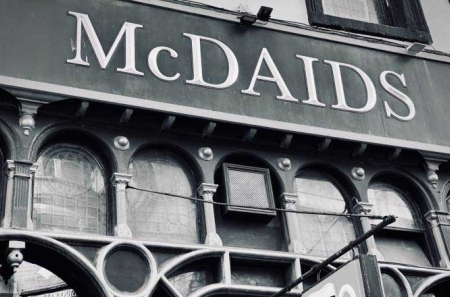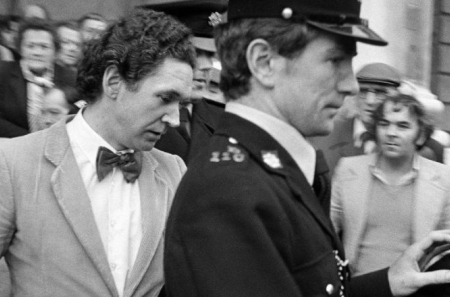
The DIB and the first Seanad election
02 April 2020The last RIA Library blog post by Siobhán Fitzpatrick, who retires this week, was on The First Seanad Éireann. To complement it we are publishing below the DIB entry on Jennie Wyse Power (1858–1941), nationalist and suffragist, one of the first four women elected to the Seanad in 1922. The entry, by William Murphy and Lesa Ní Mhunghaile, also addresses the life of the Celtic scholar Maura Wyse Power (1887–1916), her daughter.
Power, Jennie Wyse (1858–1941), nationalist and suffragist, was born Jane O'Toole in May 1858 in Baltinglass, Co. Wicklow, youngest among four sons and three daughters of Edward O'Toole (d. 1876), shopkeeper and small farmer, and Mary O'Toole (neé Norton; d. 1877). The O'Tooles were strongly nationalist and she joined the Ladies' Land League in 1881, becoming a league organiser in Wicklow and Carlow and acting as librarian to land league prisoners. As a member of the executive of the Ladies' Land League she became friendly with Anna Parnell and a strong supporter of Charles Stewart Parnell. She remained loyal to Parnell despite his disbanding of the Ladies' League (1882). On 5 July 1883 she married fellow Parnellite and journalist John Wyse Power, and moved first to Naas, Co. Kildare, and then to Dublin (1885). The Wyse Powers had four children: Catherine (b. 1885), who died in infancy; Maura, called ‘Máire’ (b. 1887); Anne, called ‘Nancy’ (b. 1889); and Charles (b. 1892), named in honour of Parnell. She supported Parnell during the split, editing Parnell's speeches in Words of the dead chief (1892) and serving as treasurer to the committee that tended his grave. Jennie opened a shop and restaurant at 21 Henry St. Dublin, called ‘The Irish Farm and Produce Company’ (1899). This became a popular meeting place for many of the cultural and political organisations with which she was involved. She joined Conradh na Gaeilge, becoming a member of its executive in November 1900. The family holidayed regularly in the Gaeltacht at Ring, Co. Waterford, where she was a member of the board of management of the Irish college.
She was a member of the Dublin Women's Suffrage Association and represented the National Women's Committee at the Franco–Irish celebrations in Paris (1900). Also in 1900 she was a co-founder and vice-president of Inghinidhe na hÉireann and a member of the committee that organised the Patriotic Children's Treat as a counter-attraction to the visit of Queen Victoria. She was elected a member of the board of guardians of North Dublin Poor Law Union (1903–12), representing the National Council of Arthur Griffith and, from 1908, Sinn Féin. She was a constant on the executive of Sinn Féin, serving as a joint or sole treasurer at various times and becoming vice-president (1911). In 1912 she was disappointed when Griffith voiced support for the Irish parliamentary party's decision to vote against the conciliation bill, which would have extended a limited franchise to women. In the same year she joined the committee founded to support Hanna Sheehy Skeffington who had been sacked and jailed because of suffragette activities; she also took Skeffington daily meals while in Mountjoy. She was a founder member of Cumann na mBan (1914) and its first president (1915), and a member of Cumann na dTeachtaire (a women's group within Sinn Féin) and the Irish Women's Franchise League. Her business had expanded to four shops, but Henry St. was still the headquarters. It was here that the proclamation of the republic (1916) was signed. Jennie and Nancy carried food from the restaurant to the rebels in the GPO as late as Wednesday in Easter week.
After the rising she was involved in the Republican Prisoners' Dependents' Fund and again became treasurer of Sinn Féin after the ‘German plot’ arrests of May 1918. In 1920 she was elected to Dublin corporation. She took her seat after a row with the council clerk, who initially refused to accept her signature in Irish. She was chairman of the finance and public health committee of the corporation and a governor of Grangegorman mental hospital. She was the only leading member of Cumann na mBan to support the treaty and join Cumann na Saoirse. As joint treasurer of Sinn Féin with Éamonn Duggan, she froze the party's accounts, refusing republicans access to the money. She was appointed to the executive of Cumann na nGaedheal and nominated to the senate (1922). When Dublin corporation was dissolved for refusing to strike a rate, she was one of the commissioners appointed to run the city (1924–9).
By 1925, however, she had become disillusioned with Cumann na nGaedheal and resigned from the party in dissatisfaction with social and economic policy and the result of the boundary commission. She continued to serve as an independent senator, being particularly vociferous on matters relating to women's status. She spoke against the Civil Service Regulation (Amendment) Bill (1925), the Juries Bill (1927), and the Conditions of Employment Bill (1935) because she felt they discriminated against women. At this time she was a member of the Irish Women's Citizens' and Local Government Association. She represented Fianna Fáil in the senate from 1934 until its dissolution in 1936. Having sold her business in 1929 she had a period of complete retirement from 1936 until her death at home, 15 Earlsfort Terrace, Dublin, on 5 January 1941. She left £5,308 to her son, Charles.
Her daughter Maura (Máire) Wyse Power (1887–1916), Celtic scholar, was born on 9 December 1887 in Fairview, Dublin. She was educated at Loreto College, Stephen's Green, Dublin, and afterwards at UCD, where she obtained a first-class honours degree in Celtic studies. Her interest in the Irish language was fostered from an early age during the family holidays in Ring. Both she and her brother and sister were members of Conradh na Gaeilge and in 1905 she won a prize for Irish in senior grade. After graduating she was awarded a travelling scholarship and moved first to the University of Marburg, Germany, and subsequently to the University of Freiburg, Germany, where she studied under the Celtic philologist Rudolf Thurneysen.
In 1912 her work on a fifteenth-century treatise on astronomy in Irish, which had been completed under the supervision of Osborn Bergin, was chosen for publication by the Irish Texts Society. It was published together with an English translation and commentaries under the title An Irish astronomical tract (1914) and established her reputation as a Celtic scholar. She continued her researches while earning a living as a part-time examiner for the Government Intermediate Board. She lost her post in 1916, after accusations that she was sympathetic to those who took part in the rising. She was reinstated, however, but placed herself under tremendous pressure to provide the most accurate examination results possible, and this has been blamed for the loss of her health.
She died after a short illness on 19 July 1916 in the home of family friends in Sandycove, Dublin. The cause of her death was certified as ‘cardiac asthma’ but Marie O'Neill speculates that this may have been a euphemism for tuberculosis. She is interred in Glasnevin cemetery. A memorial plaque was erected by her parents in University Church, St Stephen's Green, Dublin. A lengthy article on Irish historical poems from the Book of Lismore, entitled ‘Cnuche Cnoc os cionn Life’, was published posthumously in the Zeitschrift für Celtische Philologie in 1917.
Sources: BMH, WS 541 and 587, Nancy Wyse Power; Catholic Bulletin (1916), 417; An Claidheamh Soluis, 29 July 1916; ZCP, xi (1917), 315; J. Wyse Power, ‘The political influence of women in modern Ireland’, William G. Fitz-Gerald (ed.), The voice of Ireland (1923), 158–61; Ir. Press, Ir. Independent, 6 Jan. 1941; Mary M. Macken, ‘Women in the university and the college: a struggle within a struggle’, M. Tierney (ed.), A page of Irish history: the story of University College Dublin (1954), 156; Margaret Ward, Unmanageable revolutionaries (1983); Rosemary Cullen Owens, Smashing times (1984), 56, 60, 119, 122; Beathaisneis, ii (1990), 141–3; Margaret Ward, Maud Gonne(1990), 65; Marie O'Neill, From Parnell to de Valera: a biography of Jennie Wyse Power (1991), 31, 55, 84, 89; Helen Litton (ed.) Revolutionary woman: Kathleen Clarke, 1878–1972 (1991); Arthur Mitchell, Revolutionary government in Ireland (1995), 125; Ó Ceirín; Ruth Taillon, When history was made (1996), 37; Mary E. Daly, The buffer state (1997), 49; Caitriona Beaumont, ‘Women and the politics of equality: the Irish women's movement, 1930–1943’, Maryann Valiulis and Mary O'Dowd (ed.), Women and Irish history (1997), 175–6; Margaret Ward, Hanna Sheehy Skeffington (1997), 102, 110; Máire Brück and M. Conway-Piskorski, ‘A medieval treatise on astronomy recalled, with a memoir of its translator and editor Maura Power’, Irish Astronomical Journal (1998), 49–56; Michael Laffan, The resurrection of Ireland (1999), 201–2, 239, 421; John M. Regan, The Irish counter-revolution 1921–1936 (1999)
Image: RIA Library. Membership roll of the first senate of the Irish Free State, presented as a ceremonial gift by Senator Alice Stopford Green on 26 November 1924. Wyse Power's signature is second from the top, surrounded by signatures of the three other women voted into the first senate; Alice Stopford Green, Edith Costello and Eileen Cuffe, Countess of Desart.



